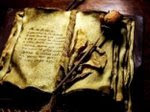
SONG: Rabbit Box
BY: Vic Chesnutt
PERFORMED BY: Vic Chesnutt
APPEARS ON: Little (Texas Hotel)
It has taken awhile for the news of Vic Chesnutt’s death to sink in. As many know, this uniquely talented singer-songwriter died on Christmas day as the result of an overdose; whether this overdose was intentional or not may never be known, tho Chesnutt apparently had some history of suicide attempts. His death is also being seen as an indictment of the U.S. healthcare system, as he’d accrued quite large amounts of debt despite being insured. Chesnutt was in poor health—he had been paralyzed from the waist down since a car accident in 1983.
Such a devastating event would have been enough to turn many away from any thought of a creative career, but in Chesnutt’s case, the accident seems to have focused his resolve in terms of music & songwriting—despite the fact that his injury compromised his strength & dexterity & forced him to rely on relatively simple chord shapes for his composing. In many ways, Chesnutt turned this liability into a virtue, because the directness & spareness of his guitar-playing makes it all the more immediate & compelling in the context of his songs.
His lyrics are always wonderfully literate—he had considerable gifts as a writer, & was also a voracious reader of poetry; he favored Stevie Smith, Emily Dickinson, Wallace Stevens & Whitman, & in fact set two Stevie Smith poems to music (“Not Waving, But Drowning” & “One of Many.”) However, saying that his lyrics are “literate” shouldn’t suggest any sort of preciousness, nor should it suggest that his words are anything other than immediate—immediacy is one of the great characteristics of his art.
Chesnutt’s 1990 debut album Little is to my mind one of the great singer-songwriter documents. He had spent the mid to late 80s performing both in bands & solo in Athens, GA, where he was spotted by R.E.M.’s Michael Stipe, who produced Little—in Chesnutt’s own words, “Mr Stipe…single handedly toted me to this cozy hotel.” The songs on the album do in the main tackle “little” subjects—small incidents, especially remembered from childhood; these small incidents, however, always seem to expand in Chesnutt’s handling to a suggestion of much larger issues.
His song “Rabbit Box” is a fine example of this. Ostensibly a song about two rather mundane childhood incidents, we can see how the stories of trapping a possum & a kitten in the live trap he’d made & shooting pigeons he believed to be doves speak to the chaos of childhood discovery—not necessarily a “wonderful” thing as portrayed in a sentimental vein, but something that can be disturbing & unsettling. There is also more than a bit of suggestion of randomness in these stories, & especially in the case of his dove hunting, of random violence. As Chesnutt sang in the song “Speed Racer” on the same album:
the idea of divine order is essentially crazy
the laws of action and reaction are the closest thing to truth in the universe
Of course, there is some sly humor in “Rabbit Box” as well—note the audience reaction at the end of the song in the video below. This humor doesn’t undercut the song’s bigger themes, but in some ways serves to deepen them by making them more real.
Chesnutt’s death is a great loss. I suspect that his star may shine more brightly as time goes by—in his life, he was much more a “cult figure” than a star. If this is your first encounter with his music, I hope it will spur you to seek more. If, like me, his music has been important to you, I hope you will celebrate his tremendous legacy even in the shadow of his death.
Rabbit Box
while I was still in elementary school
I discovered Daddy's tools
and amassed a small pile of scrap lumber
and I built a rabbit box; set it facing north
but caught a possum and a kitten
both of which were a bitch to set free
cause I thought they were going to bite me
but we all three escaped safely
once I took my single shotgun
put on some camouflage
hid in the neighbor's pasture by the cow pond
finally after a long time
a bunch of doves flew by
and landed in a huddle on the power line
so I aimed with an eagle eye and fired
but it was two pigeons that fell like bean bags into the weeds
well they sure looked like doves to me
Vic Chesnutt




